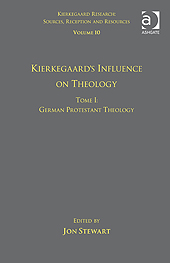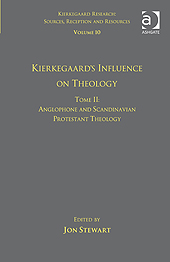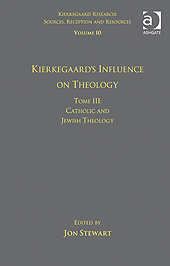
Kierkegaard Research: Sources,
Reception and Resources
|
||

  |
||

|
Volume 10:
Kierkegaard's Influence on Theology
Tome
I: German Protestant Theology
Tome
II: Anglophone and Scandinavian Protestant Theology
Farnham and Burlington: Ashgate 2012.
Kierkegaard has always enjoyed a rich reception in the fields of
theology and religious studies. This reception might seem to be
obvious given the fact that he is one of the most important
Christian writers of the nineteenth century. However, upon
closer examination, the matter is not so obvious as it may seem
since Kierkegaard was by no means a straightforward theologian
in any traditional sense. He had no enduring interest in some of
the main fields of theology such as church history or biblical
studies, and he is strikingly silent on many key Christian
dogmas. Moreover, he harbored a degree of animosity towards the
university theologians and churchmen of his own day. Despite
this, he has been a source of inspiration for numerous religious
writers from different denominations and traditions.
Tome I: German Protestant Theology
Tome I is dedicated to the reception of Kierkegaard among German Protestant theologians and religious thinkers. The writings of some of these figures turned out to be instrumental for Kierkegaard’s breakthrough internationally shortly after the turn of the twentieth century. Leading figures of the movement of “dialectical theology” such as Karl Barth, Emil Brunner, Paul Tillich and Rudolf Bultmann spawned a steadily growing awareness of and interest in Kierkegaard’s thought among generations of German theology students. Emanuel Hirsch was greatly influenced by Kierkegaard and proved instrumental in disseminating his thought by producing the first complete German edition of Kierkegaard’s published works. Both Barth and Hirsch established unique ways of reading and appropriating Kierkegaard, which to a certain degree determined the direction and course of Kierkegaard studies right up to our own times.
Table of Contents
Karl Barth: The Dialectic of Attraction
and Repulsion
Reviews
"This volume contains
fascinating articles on each of the key thinkers [in the German
reception], with in-depth analysis on the Kierkegaard texts they
read, how they used them, and what impact he made on their
overall thought. These studies highlight insightful details and
patterns that will be of enormous use to those wishing to
navigate the thought-trends of these early theologians....As
expected of this impressive series, these essays are impeccably
researched, proving extremely valuable both for Kierkegaard
scholarship and those wishing to map theological trajectories
more generally."
Tome II: Anglophone and Scandinavian Protestant Theology
Table of Contents
Part I: Anglophone Theology
Part II: Scandinavian Theology
Reviews
"Overall, this is a
vigorously-researched and stimulating collection that further
breeds discussion over Kierkegaard's relationship to theology.
Well-known areas of disputation are seen here through the eyes
of many who have wrestled with assessing Kierkegaard’s value in
theological discourse. It seems the Dane’s inconvenient voice is
not easily muted, even by those who would rather he had been a
little quieter."
Tome III:
Catholic and Jewish Theology
Tome III explores the reception of Kierkegaard’s thought in the
Catholic and Jewish theological traditions. Although the first
Catholic reactions to Kierkegaard appeared shortly after his
death, it is especially in the early decades of the twentieth
century that Kierkegaard’s thought became an important topic in
the Catholic circles. In the 1920s Kierkegaard’s intellectual
and spiritual legacy became widely discussed in the Catholic
Hochland Circle, whose members included Theodor Haecker, Romano
Guardini, Alois Dempf and Peter Wust. Another key figure of the
mid-war years was the prolific Jesuit author Erich Przywara.
During and especially after World War II Kierkegaard’s ideas
found an echo in the works of several trend-setting Catholic
theologians of the day such as Hans Urs von Balthasar, Henri de
Lubac and the popular spiritual author Thomas Merton. The second
part of Tome III focuses on the reception of Kierkegaard’s
thought in the Jewish theological tradition, introducing the
reader to authors who significantly shaped Jewish religious
thought both in the United States and in Israel. These
theologians come from and represent a variety of religious and
political backgrounds: the spiritual world of Hasidism, Modern
Orthodox Judaism of Mithnaggedic origin, and Modern Religious
Zionism.
Table of Contents
Part I: Catholic Theology
Hans Urs von
Balthasar: Persuasive Forms or Offensive Signs? Kierkegaard
and the Problems of Theological Aesthetics
Part II: Jewish Theology
Abraham Joshua
Heschel: Heschel’s Use of Kierkegaard as
Abraham Isaac Kook: Faith of Awe and Love
Reviews
“Kierkegaard Research: Sources,
Reception and Resources is continuing to prove a remarkable
achievement and is cumulatively providing an important point of
reference for all those working on Kierkegaard….Like other
volumes in the series, this contains work of a very high
quality, thoroughly researched and clearly presented.”
|
Kierkegard’s International
Reception
Kierkegaard’s Influence on Existentialism Kierkegaard’s Influence on Theology
Kierkegaard’s Influence on Philosophy
Kierkegaard’s
Influence on Literature and Criticism
Kierkegaard’s
Influence on the Social Sciences Kierkegaard’s Influence on Social-Political Thought
|
|
The
series Kierkegaard Research: Sources,
Reception and Resources is published Routledge Research, Philosophy
Routledge / Taylor & Francis Group, 711 Third Ave., Eighth Floor, New York, NY 10017, USA
|
||










